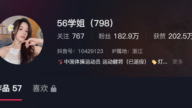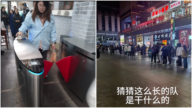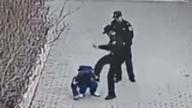【新唐人2014年01月24日讯】自中共49年窃权建政以来,特别是从1978年底进行的改革开放,至今经历了35年的所谓“中国经济崛起”,可是“地方债”、“钱荒”、“鬼城”、“通货膨胀”等中国特色问题纷纷爆发,让人惊觉中国经济背后的猫腻。那么中国的金钱和财富哪去了?日前,台湾“博大出版社”出版的《赤龙的钱囊——谢田看中国经济》一书,披露了这一中国经济的真相。
自去年6月开始,中国的“钱荒”就像雾霾一样,笼罩着中国的经济,挥之不去。21号,大陆央行注入资金3700多亿元人民币,再度引起了国际舆论对中国“钱荒”的高度关注。
旅美学者谢田认为,中国经济目前面临三大问题:地方债务、房地产泡沫以及通货膨胀。
1962年出生于赤色中国,喝着中国共产党奶水长大的谢田,曾衷心希望成为一名共产党员,直到来到西方社会,获美国“乔治亚州立大学罗宾逊商学院”工商管理硕士及市场博士,在美国待了20年,谢田渐渐从那深信不疑的“马列思想”枷锁中解开。
谢田目前研究的领域,包括中国经济和商业、市场战略、商对商营销、国际营销等。他对中国经济常有独特的见解,他表示,“我从中国大陆出来,中共公布的任何数字大家都不要相信,都是假的。你相信中国的任何数字,你一定会栽跟头。”
谢田:“实际上在过去十年中,(我)写了很多关于中国经济的评论文章,台湾出版界的朋友来信说,愿不愿意把这些文章集结成书,来做一个系统性的阐述,对中国经济的看法。这个经济不光与一般的经济不一样,(中国)经济的真相很多会被掩盖。”
去年11月《赤龙的钱囊——谢田看中国经济》(The Dragon’s Vault – Chinese Economy behind the Curtain),由台湾“博大出版社”出版、全球发行。
为书作序的台湾“中华经济研究院”研究员吴惠林教授表示,由出身红色中国的谢田,在跳脱共产社会进入自由民主的美国之后,对两种体制生活的实际体验和比较中,来诊断中国的经济,的确有说服力。
台湾中华经济研究院研究员吴惠林:“中国的经济在外人来看,像雾里看花,比较难看到中国里面比较实质的东西。他是中国人,他在中国生活很长时间,亲身经历过,现在到国外来,重新在国外的环境感受,再来比较中国的情况,单就比外国人、台湾的,或香港的看中国经济,应该是比较深入。 ”
谢田表示,《赤龙的钱囊》披露了中国60多年的经济问题,从计划经济、到后来的改革开放,以至现在的经济出现地方债问题,甚至房地产、股市泡沫等通货膨胀问题。而在其中扮演主要角色的,就是中共这个独裁统治集团。谢田说,中共的权贵绑架了中国经济。
谢田:“从开始无产阶级革命、土地改革、工商业改造,用暴力把最初的财富掠夺过去﹔从60、70年代以后,进入90年代,掠夺方式有了变化,加了很多新的内容、新的技巧,很多资本主义的因素,而这些方式也变得具有欺骗性。一方面,公然赤裸裸的掠夺,另外就是把权力直接转化成资本,很多掠夺用欺骗的方式下进行,实际上它的钱囊是这样逐渐的饱满起来。”
台湾“关怀中国人权联盟”理事长,前总统府人权委员会委员杨宪宏,在他的广播访谈节目里,谈到了自己读完《赤龙的钱囊》的感受,他表示,“这是一本很好的书。”而他在台湾书店翻看其他有关中国经济的书中,却“看到很多骗人的东西”。
相较于一些大陆出身的经济学者,他们即使来到西方或国际社会,仍无法看清中国经济乱象的根源。吴惠林表示,“中国的经济学教育是马列主义经济学,不是真正的经济学,而是政治经济学,是用马克思主义经济斗争的理论来指导、看待,是对经济学彻底的扭曲。”
采访编辑/易如 后制/李勇
The Money Bag of the Red Dragon
Since the Chinese Communist Party (CCP)
took power in 1949, and especially
since implementing the policy of opening and reform
at the end of 1978, China has experienced 35 years of
so called “China Economy Rise".
However, many of China’s characteristic major issues
including “Local Government Debt", “Coin Famine",
“Ghost City", “Inflation" and so on burst out one by one,
which alert the world to something fishy
inside China’s economic boom.
In view of these major issues,
where are China’s money and assets? Recently,
Taiwan Broad Press published a book
The Dragon’s Vault – Chinese Economy behind the Curtain,
which revealed the truth about China’s economy.
Since June last year, China’s “Coin Famine" is like a haze
which doesn’t go away,enveloping China’s economy.
Jan 21, China Central Bank released 370 billion RMB,
which triggered world media to be
highly concerned that China’s “Coin Famine"
was back once again.
American Chinese scholar Dr Xie Tian says:
“China’s economy is facing three major problems:
local government debt, a property bubble and inflation."
Dr Xie was born in Red China in 1962 and he grew up
in an environment brainwashed by the CCP,
which made him once a sincere CCP member.
Xie Tian gradually unlocked himself from the shackles
of “Marxism-Leninism" which he undoubtedly believed,
after he had been in the USA for twenty years
and after he obtained the MBA of US Robinson College Business
of Georgia State University and a PhD degree in marketing.
Dr Xie’s current research fields include
China’s economy and commerce, market strategies,
business to business marketing, international marketing etc.
He has many unique insights into China’s economy.
He says “I came from Mainland China.
Please don’t trust any figures published by the CCP.
All of them are false. If you trust any of China’s economic data,
you will surely lose money."
Xie Tian: “Actually during the past decade, (I) wrote
many economic review articles about China’s economy.
A friend who works in the Taiwan publishing field asked me
if I could compile all of these articles
and rewrite them into a book to systematically articulate
my views about China’s economy.
China’s economy is not only different from other countries’,
but also the truth of it has been hidden."
In November last year, a book The Dragon’s Vault –
Chinese Economy behind the Curtain was published
and sold across the world by Taiwan Broad Press.
Taiwan’s China Economy Academy Research Professor
Wu Huilin wrote the preface for the book.
He says, Xie Tian was born in Red China
but later left communism and
entered America with freedom and democracy.
He has personal practical experience
and contrasts two different regimes.
In view of such a background, diagnosis about China’s economy
made by Xie Tian is convincing.
Wu Huilin: “for outsiders,understanding China’s economy
is similar to seeing flowers in fog, and it is hard
to see the relatively substantial essence.
Xie is a Chinese and he lived there for a long time
with much personal experience. Later he moved abroad
and from his personal experience in an overseas environment,
he deeply analyses China’s economic status.
At least his understanding is deeper than those foreigners,
Taiwanese and Hong Kong people."
Xie Tian says, The Dragon’s Vault exposes
60 years’ of China’s economic problems from
the pre-planned economy to later reform and opening,
to current local government debt to monetary inflation
including property and stock market bubbles.
The CCP dictatorship plays a dominant role
in all of these problems. Xie Tian says
the CCP magnates kidnap China’s economy.
Xie Tian: “From the initial proletarian revolution,
land revolution to industry and commerce reform,
the CCP looted the assets by violence.
Since the 1960s and ’70s, especially after the 1990s,
the looting ways have been changed with new means,
new skills and many capitalist factors,
which disguised these methods.
On the one hand, the CCP deployed audacious looting,
on the other, the CCP magnates
transfer their power into capital.
Much looting was undertaken by deception.
As a matter of fact, the CCP’s vault bulged by these means."
Secretary of the Taiwan Association for China Human
Rights and Ex-Member of the Presidential Human Rights Committee
talked about his feelings on
reading the Dragon’s vault in his radio interview.
He says: “this is a good book".
When he looked for other books about China’s economy,
he found “many misleading statements".
Compared with some economists born in Mainland China,
even if they came into western countries,
they cannot still see the origin of China’s economic chaos.
Wu Huilin expresses: “China’s economic education is
about the Marxist-Leninist’s economy,
which is a political economy, rather than a real economy.
The economy is guided and viewed
by Marxist economic warfare,
which is a complete twist for economics."
Interview & Edit/YiRu Post-Production/LiYong




























